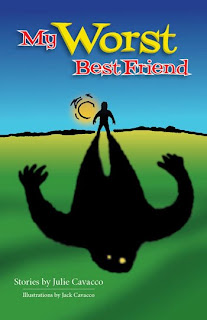My Worst Best Friend - Author, Julie Cavacco
I am so excited to share a recent interview with Julie Cavacco, author of a new children's book, "My Worst Best Friend." She is
a Children's Librarian (12 yrs) and former substitute
(15 yrs). Julie has become dedicated to getting the right book into a
student's
hands. She says, "There is so much self esteem wrapped up into when and
how we
start reading. I have seen the natural, and not necessarily bad,
competition of
first graders talking about how they can read Harry Potter. The delayed
reader
can't join in on that conversation, and eventually, they notice the
difference, which effects self esteem and eventually classroom
behavior."
Julie's own two kids, now adults, were not early dedicated readers, but, she says, they had the skills. "I've seen them, as teenagers, ignore electronics with all the bells and whistles in favor of a good book. Now, they can join in on conversations, because reading has bolstered their vocabularies.
"We, as a population, tend to
respect the well read. I want everyone to have that respect and self respect."
Hi,
Julie! So happy to have you as a guest
on the blog today. Words from the Heart,
as you may know, was started because I wanted to show the power of words - how
they can heal, bring hope and connect us to each other. So, when I learned about your book for children,
“My Worst Best Friend,” I couldn’t help but want to ask you how it all started. Why did you decide to write this particular
story?
I started this project twelve years ago because a ten-year old boy came into my library, who wanted a book on zombies. He was with his tutor. Normally, I never see a delayed reader at that age without an adult dragging them in. Delayed reading ten-year old boys don't think of books and reading as a good thing. It's hard work for them. The only thing I had for him that he could read was designed for younger kids. So, I decided that I would write him some stories about a boy, who liked zombies. I wrote eight of them that he used that for his summer reading. He turned a corner soon after, which encouraged me, immensely.
I finally talked my graphic designer husband into helping me put them together. As the big publishers limit their scope, along with the help of computers, authors can find different paths to publish their books. But, of course, I hope to get it to a publisher to take it to a much wider audience.
I think of
the delayed reader as a student, who is reading below grade level. Sometimes,
it's a result of vision impairment, attention issues or limited early exposure
to reading.
I chose to
focus on ten-year old boys, who were delayed readers because, in my experience, what they are
interested in tends to be what will appeal to most everyone. My goal is to give
them a book that they can discuss with their peers, that their peers will want
to read. I want them to have a chance to have that experience, sharing books
with others. Kids tend to compare what they read and delayed readers don't
always have that opportunity to share.
The
"hero" Andy, in the book is the narrator's worst best friend. The
narrator is a careful, thoughtful, worried kid. Andy is a bit of a devil. He
isn't always nice and he'll trick the narrator for entertainment. We can
connect with the friendship, either through the trickster or the worrier.
Do you do
readings? If so, where and when?
I am
beginning to put together author visits for schools. My main goal is to get
them into classrooms, where they tend to have silent reading periods each day. And,
that's where I think they'll make the most impact. Since we self published the
books, we don't have an endless supply, so I'm hesitant to do book readings for
bookstores. If a larger publisher ever picks them up then that could change.
What advice
do you have for children who are learning to read and write?
I think the
best way to get ahead in reading is to look at widely circulated lists for
early literacy that you can find on the Internet. These lists have words like -
and, or, the, - which are helpful to learn before entering kindergarten. There are no
pictures to easily connect them with. They just have to be memorized.
Is there
something I haven’t asked you that you would like to share with the readers?
One extra
thing I think we all can do to connect with kids and support the value of
reading is to ask them what they have read. Ask them for recommendations and
then get the book from the library. A children's book is wonderful to read
before bed because adults may actually be able to finish it before they fall
asleep.
Thank
you so much, Julie, for sharing your book and your thoughts on
childhood literacy. What a wonderful contribution you have made to
helping ALL children enjoy reading!
Namasté!




Comments
Natasha
Blessings, Linda